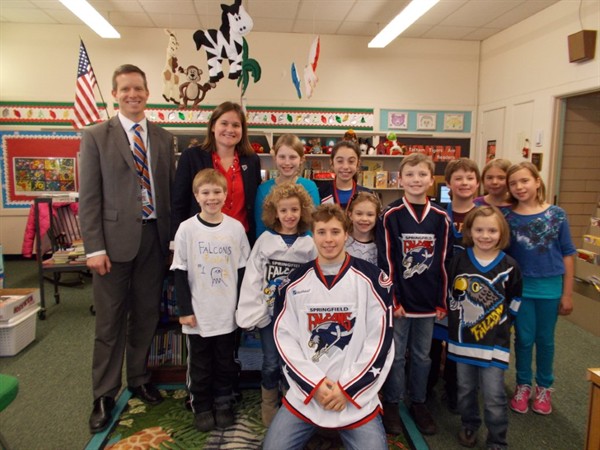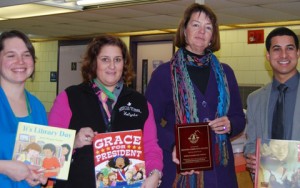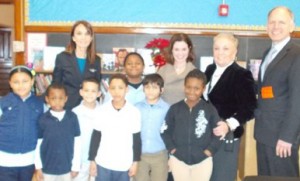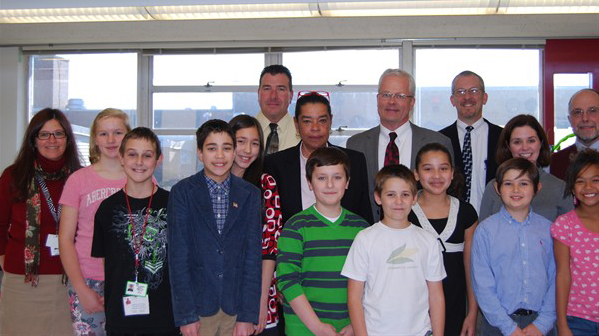Link to Libraries Program Matches Schools with Local Business Sponsors
Through the innovative Business Book Link Project, dozens of small local businesses in western Massachusetts have adopted elementary and middle schools in order to supply underserved kids with hundreds of books. The program is the brainchild of Link to Libraries, a Springfield, MA-based literacy group that also operates in Connecticut, Vermont, and New York.

Tatham School with Springfield Falcons' Sarah Pompea and star player Cam Atkinson. January 2013.
Adopting a dream “The idea was to not only increase the number of books in each site but more importantly to engage businesses and individuals to partner, sponsor, and become one with the school,” Jaye-Kaplan explains. “To let these businesses and the family feel a strong connection with ‘their school’ [so] when the three-year commitment is up, they might consider this ‘their school’ and continue.” Notes Jaye-Kaplan, “We see this already happening as they engage, and connect with us to let us know how the project is working. The children meet their benefactors, take them on tours of their schools or buildings, invite them to all sorts of school events. This only enhances the bond.” Sarah Pompea, vice president of the Springfield Falcons professional hockey team, agrees. Her organization, the Springfield Falcons Charitable Foundation, sponsors the Tatham Elementary School in West Springfield, MA, through the program.
Holyoke Community College VP Erica Broman with Morgan Elementary School's principal Aliza Pluta and teacher Alison Keller. January 2013.
"We like the LTL program because it is more personal,” Pompea tells SLJ. “Our staff and players have the opportunity to build a special relationship with the students. We are involved because we are committed to these students as the future of western Massachusetts. We are proud to support this educational effort for the children in our community." Notes Erica Broman, vice president of institutional development for Holyoke Community College, which sponsors the Morgan Elementary School in Holyoke, MA, “The personal enrichment each of us has gotten from reading to the students has been immensely rewarding on both a personal and professional level. Last year we had over a dozen staff, faculty, and senior administrators (including our president) read aloud to kindergarten to fourth-grade classrooms. We recently had a meeting where over thirty more staff and students have volunteered to continue this reading effort this year.” Holyoke is the poorest community in the Massachusetts, Broman explains. “With a large Hispanic population and a significant number of transient school-aged children, the Holyoke Public Schools have struggled over the past ten years," she says. "We could not have made this connection nor brought these books to the students had it not been for Link to Libraries.” Making a difference Even smaller local businesses have made a big impact with their sponsorships, Jaye-Kaplan says. For example, Dana R. Barrows, an estate and business planner at Northwestern Mutual Life, sponsors the Mittineague Elementary School in West Springfield. Barrows got involved, he says, “to bring more fun books to the school library,” to be a positive role model, and have fun at the same time. “I read to 27 eager, polite, fully-engaged third-graders once a month," Barrows says. "I loved reading to my four daughters, I currently love reading to and with my granddaughters, and I firmly believe reading is fundamental, and empowering, and life changing. It’s a great experience.”
U. S. Trust's Christopher Borowiec and LTL's Dr. Susan Landry with Principal Kathleen Sullivan and students at Homer Street School, Springfield.
Says Chris Borowiec, managing director of U.S. Trust, sponsor of Springfield’s Homer Street School, “We are thrilled to think our small involvement can enrich so many young people through books and learning. We cannot think of a better gift to a child than a book or 'mini library' for a school.” The local Monson Savings Bank actually sponsors two schools in the area, Quarry Hill Middle School in Monson, and the Stanley K. Koziol Elementary School in Ware. “And we are in the process of adopting a third school in Hampden,” notes Steven Lowell, bank president. “We have a number of employees, myself included, who visit classrooms and read books. It would be difficult to say who enjoys this more, the children or our employees.” Lowell tells SLJ, “We became aware of LTL about two and a half years ago and it has quickly become one of our favorite nonprofits. Our bank has a very strong tradition of being deeply involved in the community. [They] have developed a great model, which allows us the opportunity to partner with several school systems and help children directly.” How it works Since its inception in September of 2012, LTR's Business Book Link project has steadily expanded its number of participants, with the goal of reaching 50 sponsored schools or literacy nonprofits by the end of the year, Jaye-Kaplan says. “Since we are all volunteer, the goal is manageable,” she says, noting, “If we had staff, our goal would be 100 by June 2014.” Businesses interested in a Book Link sponsorship donate approximately $1200 to LTL, and must commit to a relationship of three years, in which they are expected to regularly engage with their sponsorship recipient on a one-to-one basis, Jaye-Kaplan says. LTL then matches the sponsor to a needy school. The donated funds help defray the costs of the 300–500 new books that LTL supplies to the sponsor for distributing to kids during read-alouds and other visits throughout the year. LTL is also present at the sponsor’s initial tour of a school, at which the sponsor is presented with a plaque and meets the school’s principal, where he or she presents the sponsor with a funding “wish list” of non-book supplies. LTL encourages principals to include a wide range of expenses on their wish lists, everything from dictionaries to picnic tables—both of which, incidentally, have been donated recently by sponsors to their adopted schools, Jaye-Kaplan shares.
Steven Lowell, President of Monson Savings Bank and LTL's Dr. Susan Landry at Monson Elementary School, with Dr. Mary Elizabeth Beach. November 2012.
In addition, “Some of the banks are giving financial literacy classes, kids are getting college tours and lunch, and one company gave Kindles,” Jaye-Kaplan says, though she notes that it’s up to the school principal and the sponsor to work out these details, she says. Later in the process, LTL asks sponsored schools to create thank you notes, that LTL presents back to the sponsors at least twice a year “to keep the communication open,” Jaye-Kaplan says. For those nonprofits or school districts in other states interested in pursuing a similar program, Jaye-Kaplan has lots of advice. “Do be assertive in finding potential sponsors,” she says. “Be sure you know your program from top to bottom. Be well respected in your community. Consider big and smaller businesses as well as families, and book groups. Always be flexible.” She adds, “People want to be helpful and are more often than not willing to support those in need. It is often in the presentation and how you ask. I generally send out our packet explaining our program, wait 10 days, and make a call to the person. I like to give them an opportunity to review our material and then will contact them. It is far easier with an introduction to new and potential sponsors if you have a name of someone they know, respect, and do business with.”RELATED
RECOMMENDED
CAREERS
The job outlook in 2030: Librarians will be in demand
CAREERS
The job outlook in 2030: Librarians will be in demand
ALREADY A SUBSCRIBER? LOG IN
We are currently offering this content for free. Sign up now to activate your personal profile, where you can save articles for future viewing






Add Comment :-
Be the first reader to comment.
Comment Policy:
Comment should not be empty !!!